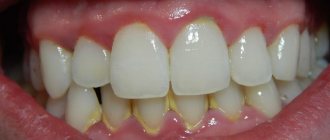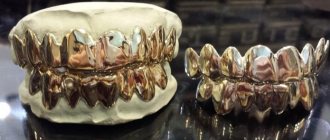Author of the article:
Soldatova Lyudmila Nikolaevna
Candidate of Medical Sciences, Professor of the Department of Clinical Dentistry of the St. Petersburg Medical and Social Institute, Chief Physician of the Alfa-Dent Dental Clinic, St. Petersburg
Coconut oil is a popular folk remedy for teeth whitening. But it is worth remembering that all such miracle remedies have a rather modest effect, like banana peels. Therefore, if you want to achieve real results, it is better to contact your dentist and choose one of the in-office or professional home whitening methods, for example, photo whitening, laser and others. In addition, you can use specialized pastes that will ensure safe and effective lightening of surface enamel pigmentation.
Coconut oil is more suitable for light prevention and disinfection of the oral cavity. The most common practice of using this product involves its resorption. The procedure is very simple: you need to place a small amount of oil in your mouth and “rinse” your mouth with it, as if it were a regular mouthwash. This method was used by the ancient Hindus more than a thousand years ago, and to this day it is widespread in India.
You need to keep the oil in your mouth for at least 20 minutes, and then spit it out. This will reduce the amount of harmful bacteria in your mouth, preventing tooth decay and other problems.
The fact is that in our mouths there are a large number of different bacteria that create a biological film on the teeth - dental plaque. A small amount of it is quite normal, but if the substance becomes too much, gingivitis, an unpleasant odor, and inflammation of the gums may appear. At the same time, the teeth become more and more saturated yellow.
Why choose coconut oil?
For such purposes, you can use a variety of oils, for example, lemon, tea tree, sesame or even sunflower oil. But coconut oil has a number of additional beneficial properties and a rather pleasant taste. This oil contains lauric acid, which has antimicrobial properties. The substance prevents the spread of viruses, pathogenic bacteria and fungi.
At the same time, doctors advise not to get carried away with folk remedies, but to use special mouth rinses, which have a more pronounced antiseptic effect, help relieve inflammation and reduce pain.
What you need to know
It is important not only to follow the recommended duration of the procedure, but also to know which coconut oil to rinse your mouth with. Only a cold-pressed liquid product is suitable for this. It is worth noting that in rare cases a number of side effects are observed:
- Development of allergic reactions;
- Bloating;
- Diarrhea;
- The occurrence of bad breath.
The latter effect is temporary and disappears after just a few uses. You should not expect stunning results, since the effectiveness of the method has not been proven by science. The procedure is advisory in nature.
Doctors are still conducting clinical trials, but their results are not enough to refute or confirm the effectiveness of the theory of Ayurveda doctor F. Karach.
Properties of coconut oil
Many ailments begin their journey in our body from the oral cavity, since this is where the optimal conditions are for the proliferation of bacteria and viruses. They enter the bloodstream through the gums and other areas of the mucous membrane. In addition, pathogenic microbes penetrate the teeth, destroying enamel and dentin. Bacteria enter the stomach with saliva and food.
At the same time, brushing your teeth allows you to get rid of about 10% of pathogens if you brush with regular store-bought toothpaste. You can enhance its effect with coconut oil, which not only helps to better clean the oral cavity, but also improves the health of teeth and gums, increasing their protection.
- Regularly rinsing your mouth with coconut oil will help strengthen your entire immune system, reducing the likelihood of bronchitis, migraines, sinusitis and other diseases.
- In addition, coconut oil relieves bad breath, inflammation of the gums, and reduces the likelihood of the formation of tartar and ulcers on the mucous membrane. The oil also reduces tooth sensitivity.
- Coconut oil promotes good absorption of various minerals by the body: magnesium, calcium, etc.
It is worth remembering that no matter how large a range of beneficial properties the oil has, specialized dental products are much more effective.
Ayurvedic recipe
Today, a homemade dental and oral care procedure such as coconut oil pulling is gaining popularity. It is believed that it helps destroy pathogenic microflora and maintain dental health. In fact, this recipe goes back a long way and is one of the cleansing practices in Ayurveda, the traditional system of Indian folk medicine. Ayurveda recommended keeping 1-2 tablespoons of vegetable oil in the mouth for 15-20 minutes to cleanse the oral cavity. During this time, the color and consistency of the oil changed. It became thicker, acquired a milky tint, and doubled in volume due to mixing with saliva.
In India, sesame oil is predominantly used for rinsing, but sunflower and coconut oil are acceptable. In our country, it is the latter that has gained popularity due to the beneficial properties of lauric acid. According to Ayurvedic medicine, the main requirements for vegetable oil for rinsing the mouth are cold pressed and no refining (removing impurities and aromatic substances).
According to followers of traditional Indian medicine, the procedure of rinsing the mouth with sesame or coconut oil gives a powerful healing effect and helps solve the following problems:
- strengthens gums, reduces their bleeding, serves as a prevention of gingivitis (inflammation of the gums);
- strengthens tooth enamel, destroys pathogenic bacteria, helps in the prevention of dental caries;
- neutralizes bad breath, provides fresh breath;
- removes toxins;
- helps get rid of mucus in the sinuses, strengthens the maxillofacial muscles, improves digestive processes.
Ways to Use Coconut Oil for Teeth Whitening
The most popular way is as follows:
- take a tablespoon of oil;
- rinse your mouth with it for about 15 - 20 minutes;
- Once you're done, spit out the oil and brush your teeth.
Important:
- Never swallow the oil after the procedure, as it accumulates harmful bacteria that must be removed from the body.
- If the procedure is carried out correctly, the oil should turn into a light milky liquid.
- If the butter has hardened, chew it first to warm it up.
- It is best to carry out the procedure in the morning on an empty stomach before brushing your teeth, but if this is inconvenient, you can choose any other time.
- Try not just to keep the oil in your mouth, but to intensively rinse the entire cavity with it, pass it through your teeth back and forth.
- After the procedure, it is better to spit the oil into the toilet or trash can; it is very greasy, so it can clog the sink.
- Don't forget to rinse your mouth with water and brush your teeth thoroughly.
The right oil
For the best effect, it is recommended to choose unrefined, cold-pressed oil, as it retains the maximum concentration of saturated fatty acids. The composition should not contain artificial additives or impurities.
The natural product has a specific smell and taste that not everyone likes. To diversify the procedures and make them more comfortable, you can dilute the product with a drop of cinnamon, mint or clove essential oil. These natural supplements have vibrant flavors and are beneficial to the body. However, some people are attracted to the natural taste. They find it exotic and enjoyable.
Not only pure products, but also ready-made hygiene products are successfully used for oral care. Today there is a wide range of coconut-based mouthwashes on the market. You can also add oil to the toothpaste that you are used to using every day.
Article on the topic
Hollywood smile. How to whiten teeth at home?
When will the effect appear?
The first improvements become noticeable after about two weeks: gum inflammation disappears, breath becomes fresh, teeth gradually become lighter.
Some people think that using coconut oil will help restore tooth enamel, but there is no scientific evidence to support this. The oil is not a source of minerals, but rather helps prevent the enamel from being destroyed. If you want to restore enamel, use the services of dentists or special remineralizing agents.
Teeth whitening with coconut oil
In fact, coconut oil cannot significantly lighten teeth as it does not have whitening properties. But it helps eliminate harmful bacteria that cause yellow plaque to appear on teeth, which helps restore the enamel to its natural color. However, it is not a fact that the effect will be the way you want.
It is better to use professional mechanical or ultrasonic teeth cleaning; both of these methods allow you to completely remove soft yellow plaque from your teeth, and ultrasound can also destroy hard deposits - tartar.
Traditional recipe for whitening paste made from coconut oil:
- You will need to mix two tablespoons of coconut oil and the same amount of baking soda to form a paste.
- Add 10 drops of peppermint oil or other essential oil to help improve the smell and taste of the paste.
- When using this paste, carefully monitor the condition of your teeth and gums. Everyone’s body reacts individually; in some cases, tooth sensitivity may increase or irritation on the gums may appear, then the procedure should be stopped.
Whitening toothpaste
- Melt half a cup of unrefined organic coconut oil over low heat.
- When melted, remove from heat and add 2 tbsp. soda Stir.
- Let the mass settle.
- You can also add essential oil to it for freshness.
- Wet your toothbrush, take a small amount of this paste onto the brush and brush your teeth.
- Again, watch how your teeth react to the toothpaste - whether it is right for you or not.
In summary, here are the benefits of coconut oil for teeth and gums. It's also good for nails.
Clinical researches
A study of the clinical effectiveness of therapeutic and prophylactic products of the Asepta line in the treatment of inflammatory periodontal diseases, carried out in the department of periodontology of the Central Research Institute of Dental Diseases and Maxillofacial Surgery of Rosmedtekhnologii (Moscow), revealed the high effectiveness of the Asepta gum balm and the Asepta mouth rinse for periodontitis. moderate severity. Asepta gum gel also turned out to be effective.
The use of Asepta mouth rinse turned out to be quite effective. In addition, no phenomena of mucosal irritation or brown staining of fillings were recorded. This indicates that the use of this rinse for a two-week period provides an obvious clinical effect in the absence of negative side effects.
Consumer Reviews
SolAlena777 about Asepta Fresh mouth rinse (irecommend.ru)
“Recently, I have been hearing more and more positive reviews about ASEPTA products. So I decided to try something. The ASEPTA FRESH mouth rinse caught my eye...
...I liked the packaging design. Reminds me of a flask. As if the product had just been brought from a chemical laboratory...
...Active components contained in the rinse aid:
- Xylitol and potassium citrate protect tooth enamel and help reduce tooth sensitivity;
- Extracts of sage, chamomile and witch hazel have antimicrobial and anti-inflammatory effects
- Potassium and sodium pyrophosphates prevent the formation of tartar
- Lime and mint provide a pleasant taste and fresh breath
...I really liked that there was no vigor. The mouthwash reminds me of Schweppes carbonated drink, only without the gases and without as much sugar.
I use it 2 times a day, that is, in the morning and in the evening after brushing my teeth with toothpaste. I probably rinse my mouth for at least 20 seconds. To be honest, I try to keep the mouthwash in my mouth longer because I like the taste and I don’t experience any discomfort during use.
For me, a rinse aid is, first of all, protection against plaque throughout the day. I can note that the rinse aid copes with this with a bang. The feeling of clean, plaque-free teeth lasts throughout the day. Maybe this effect weakens a little in the evening, but I like the result...
...I was quite satisfied with the result. Most likely, I will buy ASEPTA FRESH mouth rinse again!”
Sources:
- Study of the clinical effectiveness of treatment and prophylactic agents of the Asepta line in the treatment of inflammatory periodontal diseases (A.I. Grudyanov, I.Yu. Aleksandrovskaya, V.Yu. Korzunina) A.I. GRUDYANOV, Doctor of Medical Sciences, Prof., Head of Department I.Yu. ALEXANDROVSKAYA, Ph.D. V.Yu. KORZUNINA, asp. Department of Periodontology, Central Research Institute of Dentistry and Maxillofacial Surgery, Rosmedtekhnologii, Moscow
- Report on determining/confirming the preventive properties of toothpaste “ASEPTA PLUS” GENTLE WHITENING” Author: doctor-researcher A.A. Leontyev, head Department of Preventive Dentistry, Doctor of Medical Sciences, Professor S.B. Ulitovsky First St. Petersburg State Medical University named after. acad. I.P. Pavlova, Department of Preventive Dentistry
- The role of anti-inflammatory rinse in the treatment of periodontal diseases (L.Yu. Orekhova, A.A. Leontyev, S.B. Ulitovsky) L.Yu. OREKHOVA, Doctor of Medical Sciences, Prof., Head of Department; A.A. LEONTIEV, dentist; S.B. ULITOVSKY, Doctor of Medical Sciences, Prof. Department of Therapeutic Dentistry of St. Petersburg State Medical University named after. acad. I. P. Pavlova
Recipes
You can actually whiten your teeth with coconut oil; you can buy products in the store or prepare them yourself.
Recipe No. 1
A great whitening recipe is rinsing. To do this, take a tablespoon of butter and melt it in a water bath - it should be slightly warm. You need to rinse for a long time - at least 15 minutes daily, it is better to do this before bed. After this, you should not eat or drink any coloring drinks!
Recipe No. 2
Another great recipe for teeth whitening is oil and baking soda. Mix these two components, you should get a paste-like paste, apply it to your teeth and brush as with a regular paste. This mixture does not need to be used often, twice a week is enough, since soda is an abrasive substance and it increases tooth sensitivity.
Recipe No. 2
Another option is butter and salt, but this recipe is not recommended, although it can often be found on molds. It is permissible to use finely ground salt - it must also be mixed with oil. You cannot use coarse grinding and in general, use this mixture no more than once a week, it can negatively affect the condition of the enamel.
To brush your teeth, you can use your regular favorite toothpaste, but add a few drops of coconut oil to it each time. This mixture can be used continuously until you achieve certain noticeable results.
Teeth whitening with coconut oil will give results if you buy high-quality, proven products and products. See for yourself - look at the before and after photos, try to experiment with it yourself!











